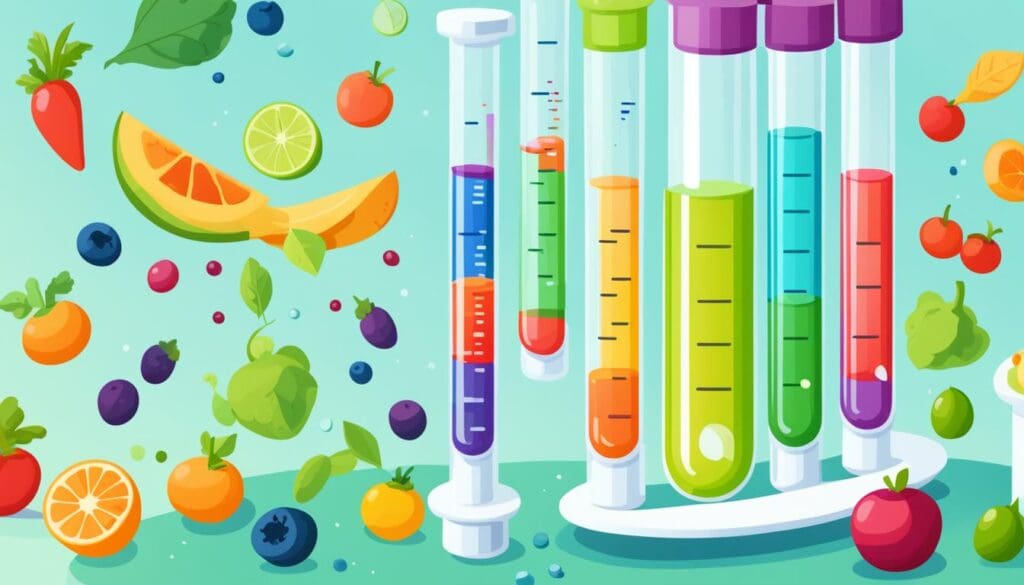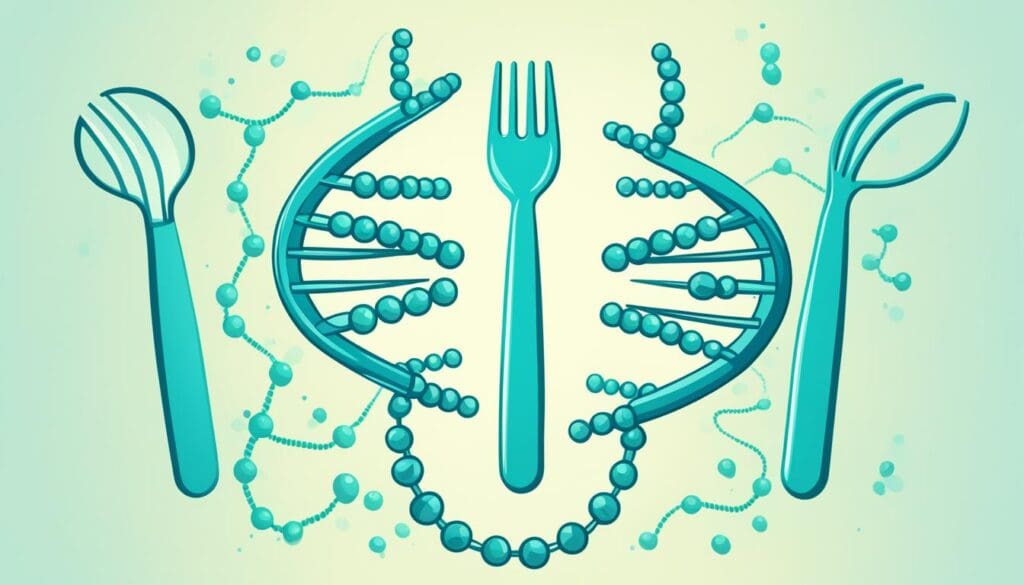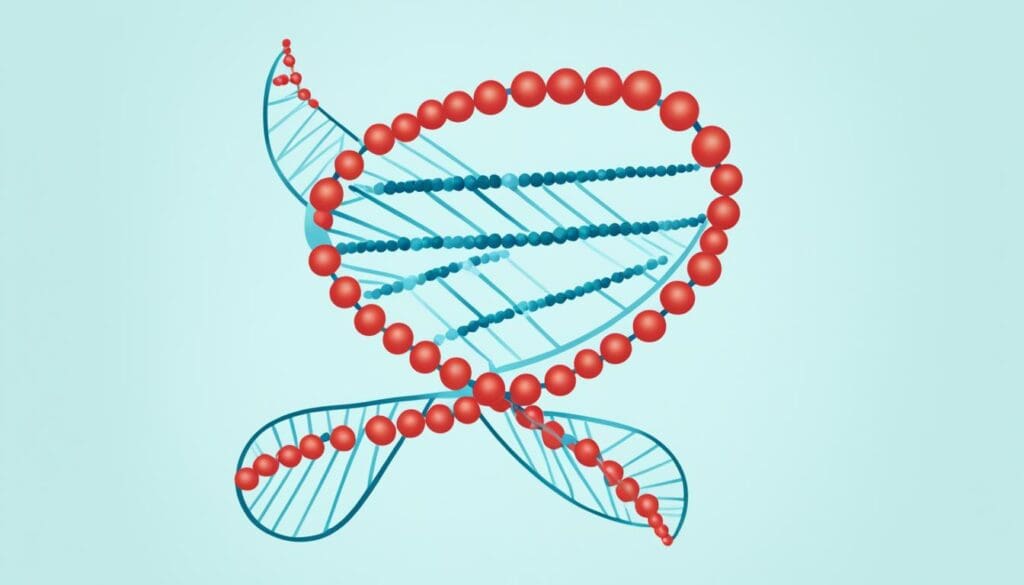Did you know the genetic testing field has grown by 11.6% each year in the past five years? This change shows a big shift in how we look at food and health. Now, DNA testing changes how we think about our food, giving advice that suits each person perfectly.
Thanks to genetic testing, we now grasp our body’s unique structure. This shows how our genes affect things like how we digest food and what we might not tolerate well. This new approach, known as precision nutrition, changes how we eat according to our genes.
Experts in the field of nutritional genomics mix nutrition and genetics. They look at genes like MTHFR, FTO, and APOA2 to give very specific advice. This advice ranges from how well we absorb folate to how our bodies might deal with fats.

This new, tailored dieting isn’t just about managing weight, either. Research says 73% of nutrigenomics studies tie personalized diets to better health outcomes. This means eating right for your genes could protect your health in the long run.
Key Takeaways
- DNA testing in nutrition has grown 11.6% annually in recent years
- Genetic analysis reveals individual metabolism and nutrient absorption patterns
- Specific genes like MTHFR, FTO, and APOA2 influence dietary needs
- 73% of studies link personalized diets to improved disease prevention
- Precision nutrition offers tailored advice beyond traditional diet plans
Understanding the Basics of Personalized Nutrition
Personalized nutrition is changing how we think about food and health. It goes beyond just telling you to eat your veggies. We now look at your genetic code to see what foods are best for you.
What is personalized nutrition?
This nutrition approach is all about you. It uses your genetic info to make a unique eating plan. We know each person’s body is different and reacts to food in its own way.
The role of genetic testing in dietary advice
Genetic testing opens doors to your body’s true food needs. It looks at your DNA to find out how you handle different foods. Then, it tailors a diet plan just for you.
Moving beyond one-size-fits-all diet plans
Old, standard diets are being left behind. Nutrigenomics is making real, personalized eating possible. Recent studies found that diets based on DNA led to better blood sugar levels in people over time.
| Diet Type | Fasting Plasma Glucose Change | HbA1c Change |
|---|---|---|
| Standard Care | No significant change | No significant change |
| DNA-Based Diet | -0.019 (p=0.01) | -0.038 (p=0.04) |
This change to personalized nutrition is supported by a rise in health knowledge and the promise of genomics. It’s more than just losing weight; it’s about making your health the best it can be based on your unique genes.
The Science Behind Nutrigenomics
Nutrigenomics is changing how we see nutrition. It studies the impact of diet on our genes and metabolism. This leads to advice on eating based on your genes. It helps make your diet better for your health.
Diets based on your DNA are not just in science fiction. Studies link what we eat to health issues like heart disease and diabetes. With nutrigenetics, we can see how genes affect how we react to food.
For example, some genes can change how your body breaks down carbs. Variations in the ADRB2 gene (like rs1042714 and rs1042713) can affect carb digestion. They might raise the risk of conditions such as type 2 diabetes. Knowing this means you can get diet tips that are just for you.
Nutrigenomic tests can unveil some cool facts about what you need, such as how you process caffeine. They can also point out if you’d do well on diets like low-carb or Mediterranean. This information lets you pick foods that suit your genes.
| Gene | Variant | Potential Impact |
|---|---|---|
| ADRB2 | rs1042714, rs1042713 | Carbohydrate metabolism, diabetes risk |
| PPARG | rs1801282 | Insulin sensitivity, obesity protection |
Yet, customizing diets with genes can be tricky. It means finding what’s right for each person while also thinking about privacy and ethics. As we learn more, diet advice based on DNA will get even better.
How DNA Testing Works for Nutritional Insights
DNA testing is changing how we look at personal nutrition. With genetic tests, we learn more about how our bodies use food. This info helps us get advice on what to eat that’s just for us.
Types of Genetic Tests for Nutrition
Nutrigenomic tests look at specific genes. They check over 70 genes to see our risks for certain diseases and how our bodies process food. All you need is a quick cheek swab or blood sample for these tests.
Genetic Markers Under the Microscope
These tests focus on SNPs, which show DNA variations. SNPs help tell if our bodies might react differently to some foods or nutrients.
- FTO gene: linked to obesity risk and fat metabolism
- MTHFR gene: affects folate processing
- LCT gene: determines lactose tolerance
Interpreting DNA Test Results
Knowing your genetic profile can lead to a nutrition plan just for you. For instance, if your LCT gene varies, you might need to cut out dairy. And if your FTO gene changes, adjusting what kind of food you eat can help with your weight.
“Nutrigenomics offers potential benefits in personalized nutrition recommendations based on DNA analysis, but more research is needed to fully understand gene-nutrition interactions.”
Though DNA diets are a new field, they hold much promise. Tests typically cost around $300. But, keep in mind privacy and talk to a doctor or nutritionist about your results. They can develop a detailed nutrition plan that works for you.
Personalized nutrition: How DNA testing is revolutionizing dietary advice

DNA testing is changing nutrition for the better. It looks at your genes to make a diet plan just for you. This method gives you diet advice that’s special to how your body works.
Looking at your genes can show how your body manages food and vitamins. This can suggest why you might need more or less of certain nutrients. For instance, someone might not need much iron, while another might need more vitamin B12.
Some research supports this new way of eating:
- The Habit Study showed people ate fewer calories and had a better body mass index.
- The Food4Me study proved that getting personal advice beats general recommendations for eating better.
- Tests on nutrition genes can check over 70 genes to see risks for diseases and how your body works.
When they add in your lifestyle and where you live, experts can make really specific diet tips. This method seems to help with how your body works, keeping a healthy weight, and avoiding diseases.
“Personalized nutrition programs can be effective in enhancing lifestyle habits, reducing body weight, and engaging individuals to improve dietary choices.”
The study of nutrigenomics is getting better. As we learn more and get better technology, making diets just for you is getting simpler and more effective. This trend is making healthy eating more personal than ever.
Benefits of DNA-Based Dietary Recommendations
DNA-based dietary recommendations are changing how we think about health. They use our genetic makeup to create personalized health plans. This approach offers more benefits than the usual advice that everyone should eat the same.
Improved Metabolic Health Outcomes
Genetic testing can show how your body reacts to different nutrients. This can lead to diet plans that are tailor-made for you. For instance, some folks do well with lots of fats, but for others, it might raise their cholesterol.
Enhanced Weight Management Strategies
DNA diets give insights into how genetics affect our metabolism and how we store fat. They can be very helpful in managing weight effectively. By focusing on your specific genetics, you can create a plan that keeps you healthy for the long term.
Targeted Disease Prevention
Knowing your genetic risks can guide you towards diets that might prevent diseases. Even though genes are a small part of some diseases, eating the right way can still matter a lot.
“Genetics accounted for less than a third of the subjects’ insulin and triglyceride responses in the study, suggesting that factors such as sleep habits, exercise, stress, and gut microbes play a significant role in individual responses to diet.”
| Benefit | Description |
|---|---|
| Optimized Nutrient Intake | Tailored recommendations based on genetic markers for nutrient metabolism |
| Food Sensitivity Insights | Identification of potential allergies or intolerances |
| Personalized Meal Plans | Customized recipes and grocery lists based on DNA composition |
While DNA diets sound great, always talk to a doctor before changing your food too much. Genetic advice is important, but it’s just one part of staying healthy.
Limitations and Considerations of Genetic Testing for Nutrition

Genetic testing for nutrition is full of exciting possibilities. It can give us important insights. But remember, these tests don’t show the full picture. The PREDICT study showed that less than a third of how we react to food comes from our genes.
Nutrigenomics is complex. It’s about how our genes and what we eat interact. Research from 2015 says we can’t trust most commercial tests. So, be careful when you get your results.
There are also ethical concerns. The Academy of Nutrition and Dietetics warns against direct-to-consumer tests. They worry about privacy and how the info might be used. With the market growing fast, we need to look after these risks.
“Genetic testing can help individuals understand their strengths and weaknesses, but it’s not a magic solution. A balanced approach considering lifestyle factors is key.”
Despite these issues, using genetics for personalized nutrition is moving forward. As we learn more, we could figure out how to better use this tech for our health.
Integrating DNA Test Results with Other Health Factors
DNA tests give great insights about your genes. But, they’re just part of the big picture of health. To understand your health fully, you need to look at genetic info along with how you live and the world around you.
Combining Genetic Data with Lifestyle Information
Your DNA is not the whole story. How you live also matters a lot. Things like sleep, exercise, and how you handle stress affect your health, including how your body deals with food. So, it’s key to think about these along with your genes to plan the best diet for you.
The Role of Environmental Factors in Nutrition
The world around you also changes what you need to eat. Climate, how clean the air is, and the food you can get all influence how your body uses food. For a diet that really fits you, these factors need to be considered. Recommendations will then be tailored to what’s best given your specific situation.
Importance of Ongoing Health Monitoring
Health changes as you go through life. Tracking with regular check-ups and tests helps see if your diet plan is working well. It’s by keeping an eye on things like cholesterol and blood sugar that you can adjust what you eat for the best health outcomes.
| Health Factor | Impact on Nutrition | Monitoring Method |
|---|---|---|
| Genetic Predisposition | Influences nutrient metabolism | DNA testing |
| Sleep Quality | Affects appetite and metabolism | Sleep tracking devices |
| Stress Levels | Impacts digestion and nutrient absorption | Stress management apps |
| Environmental Toxins | May increase nutritional needs | Environmental health assessments |
By taking into account many different factors, you can make a nutrition plan that really fits you. This way, your diet can meet your changing needs and health goals.
The Future of Personalized Nutrition and DNA Testing
The world of nutritional genomics is growing fast. It’s making personalized diets more common. A 2016 study published in the Journal of Nutrigenetics and Nutrigenomics showed how this could help manage obesity-related diseases. Soon, your genes could help decide what you eat.
Innovations in genetic health will change nutrition. The Human Genome Project lasted 13 years and revealed 50,000 genetic differences that affect how our bodies work. Now, this information is leading to better genetic tests and understanding of how genes and food interact. You may soon get special foods made just for you, based on your DNA.
The use of artificial intelligence in creating diets that fit your genes is on the horizon. AI could make sense of large amounts of genetic data, helping to give advice that’s just right for you. With more studies, experts find that using nutrigenetics to recommend diets is backed by science. Soon, we may have diets that are even more targeted and effective than ever due to our genetic profiles.
FAQ
What is personalized nutrition?
Personalized nutrition makes diet plans based on your genes. It knows we all react differently to food because of our genes.
How does genetic testing help with dietary advice?
With genetic testing, we can see how genes react to food. This helps give the right food advice for each person.
What is the difference between nutrigenomics and nutrigenetics?
Nutrigenomics looks at how food affects our genes and body functions. Nutrigenetics looks at how genes affect our food reactions.
Together, they help give personal diet advice based on our genes.
What types of genetic tests are used for personalized nutrition?
Tests in nutrigenomics look at single changes in our genes. They explore over 70 genes linked to diseases, how we process food, and what food we like.
How have studies demonstrated the benefits of personalized nutrition?
The Habit Study and Food4Me study saw diet and lifestyle improvements. They noticed better health and lasting changes in eating thanks to personalized plans based on genes.
What are the limitations of genetic testing for nutrition?
Genetic tests offer key insights but can’t stand alone for diet tips. We need to also look at sleep, exercise, stress, and gut health for the full diet picture.
How should DNA test results be integrated with other health factors?
Good diet plans mix DNA results with lifestyle info and health checks. This makes sure we get the best advice over time.
What does the future hold for personalized nutrition and DNA testing?
Soon, we might have better genetic tests and data tools to understand them. With AI’s help, we’ll learn more about how genes meet food and health.
Source Links
- https://www.linkedin.com/pulse/future-nutrition-personalized-diets-based-genetic-testing-lonquist-uqucc?trk=public_post – The Future of Nutrition: Personalized Diets Based on Genetic Testing
- https://futuramo.com/blog/the-future-of-nutrition-how-personalized-diets-are-changing-the-way-we-eat/ – Revolutionizing Nutrition: The Rise of Personalized Diets
- https://www.ncbi.nlm.nih.gov/pmc/articles/PMC11157041/ – Personalized nutrition: the end of the one-diet-fits-all era
- https://www.nature.com/articles/s41598-024-55105-6 – Assessment of the impact of a personalised nutrition intervention in impaired glucose regulation over 26 weeks: a randomised controlled trial – Scientific Reports
- https://www.solutionbuggy.com/blog/personalized-nutrition-impact-on-food-manufacturing – Personalized Nutrition: Impact on Food Manufacturing
- https://www.mdpi.com/2072-6643/12/10/3118 – Genomics in Personalized Nutrition: Can You “Eat for Your Genes”?
- https://www.ncbi.nlm.nih.gov/pmc/articles/PMC7217104/ – Personalized Nutrition and -Omics
- https://www.news-medical.net/health/Nutrigenomics-How-Your-Genes-Influence-Your-Nutritional-Needs-and-Health.aspx – Nutrigenomics: How Your Genes Influence Your Nutritional Needs and Health
- https://www.linkedin.com/pulse/how-nutrigenomics-changing-way-we-think-food-xcode-life-sciences-js0dc?trk=public_post – How Nutrigenomics is Changing the Way We Think About Food
- https://www.ncbi.nlm.nih.gov/pmc/articles/PMC5224962/ – The DNA-based diet
- https://www.today.com/health/do-personalized-diets-work-t183387 – Do DNA-based diets work?
- https://www.ncbi.nlm.nih.gov/pmc/articles/PMC4414021/ – Nutrigenomics and Personalized Diets: What Will They Mean for Food?
- https://www.rupahealth.com/post/personalized-nutrition-tailoring-diet-plans-to-genetic-profiles – No title found
- https://www.ncbi.nlm.nih.gov/pmc/articles/PMC8166555/ – Does Personalized Nutrition Advice Improve Dietary Intake in Healthy Adults? A Systematic Review of Randomized Controlled Trials
- https://www.gulla.net/en/ai/revolutionizing-nutrition-the-science-behind-personalized-diets-and-optimal-health/ – Revolutionizing Nutrition: The Science Behind Personalized Diets and Optimal Health
- https://www.scientificamerican.com/article/personalized-nutrition-the-latest-on-dna-based-diets/ – Personalized Nutrition: The Latest on DNA-Based Diets
- https://timesofindia.indiatimes.com/life-style/health-fitness/health-news/ever-heard-of-a-dna-based-diet-well-here-are-a-few-things-to-know-about-this-futuristic-diet-trend/articleshow/109987177.cms – Ever heard of a DNA based diet? Well, here are a few things to know about this futuristic diet trend – Times of India
- https://www.news-medical.net/health/What-is-a-DNA-Diet.aspx – What is a DNA Diet?
- https://www.vox.com/2016/11/2/13453434/personalized-diet-nutrition-dna – "Personalized nutrition” isn’t going to solve our diet problems
- https://www.hscn.org/post/nutrition-dna-test – Decoding Your Health: A Comprehensive Guide to Nutrition DNA Test
- https://www.cnn.com/2024/02/06/health/dna-analysis-fitness-wellness/index.html – Can a DNA analysis help improve your fitness? | CNN
- https://www.linkedin.com/pulse/dna-testing-personalized-nutrition-market-scbje/ – DNA Testing for Personalized Nutrition Market Size, Trends Overview: Share, Scope, and Trends for 2024-2031
- https://www.orlandohealth.com/content-hub/personalized-nutrition-taking-diet-science-to-the-next-level/ – Personalized Nutrition: Taking Diet Science to the Next Level
- https://www.sciencedirect.com/science/article/abs/pii/S0924224422003673 – Precision nutrition: A review of current approaches and future endeavors
- https://www.ncbi.nlm.nih.gov/pmc/articles/PMC6081996/ – Science and Politics of Nutrition: Personalised nutrition and health
- https://www.news-medical.net/news/20190528/Are-DNA-based-diets-and-personalized-medical-foods-the-future-for-weight-loss.aspx – Are DNA-based diets and personalized ‘medical foods’ the future for weight loss?
- https://www.genopalate.com/ – Nutrition DNA Test – Eat For Your Genes | GenoPalate